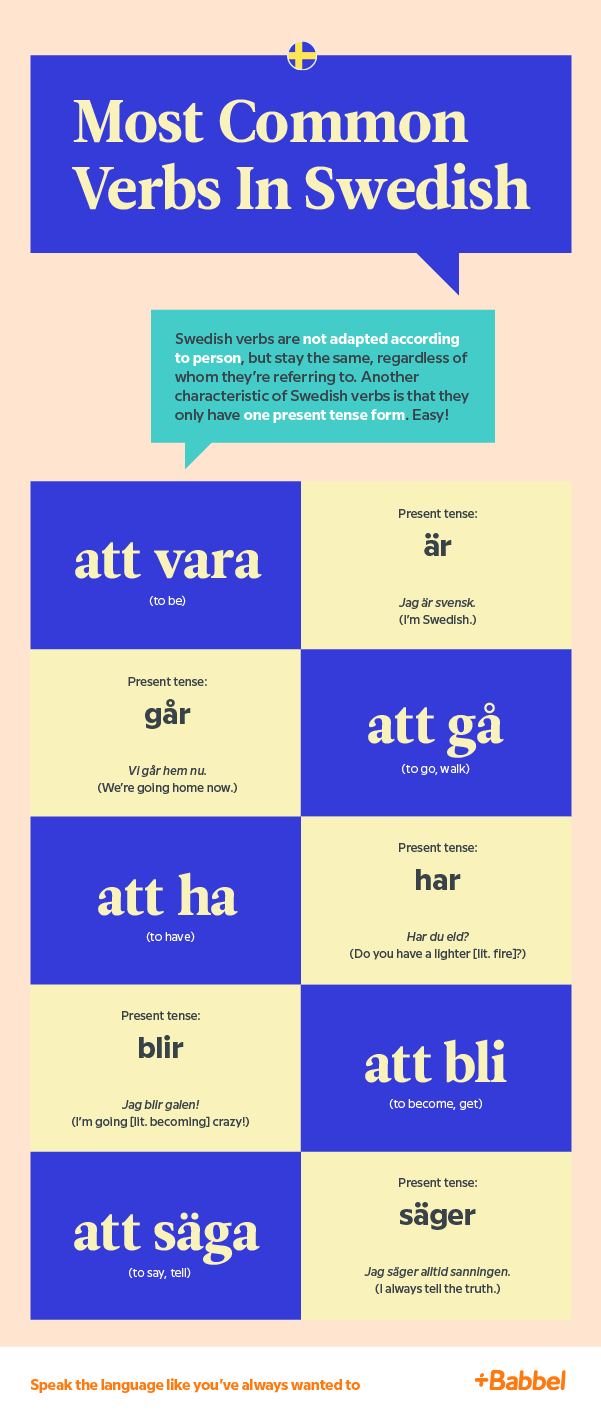It’s great that you’re interested in learning Swedish, a Germanic language (just like English) spoken by about 10 million people. Soon, you’ll finally be able to tell what your IKEA rug is actually called or write fan letters to Oscar-winner Alicia Vikander in her native language! Lucky for you, Swedish is also an easy language to learn in the beginning. Why? Swedish verbs!
Swedish verbs are not conjugated according to the person performing them, but stay the same, regardless of whom they’re referring to. Another characteristic of Swedish verbs is that they only have one present tense form: there isn’t really an equivalent to the English -ing ending. This means you would literally say, “I go now. Bye!” (Jag går nu. Hejdå!)

Verbs are crucial (or rather, indispensable) for creating sentences, and if you know the most common Swedish verbs, you will have a really good starting point for learning your new language. Before we get to all 20, you can also check out our guide to the top five Swedish verbs.

The Most Common Swedish Verbs
1. att vara — to be
Present tense: är
As in: Jag är svensk. (“I’m Swedish.”)
2. att få — to get, may
Present tense: får
The double meaning of this verb makes it a very common word!
As in: Jag får inte nog! (“I can’t get enough!”) and Får jag gå nu? (“May I leave now?”)
3. att ha — to have
Present tense: har
As in: Har du eld? (“Do you have a lighter [lit. fire]?”)
4. ska — shall, will
Ska is present tense already — it’s a modal verb used with other Swedish verbs in the infinitive.
With ska, you can also talk about the future. As in: Vi ska få barn! (“We’re having children!”)
5. kan — can
Like ska, kan is also a modal verb.
As in: Kan du hjälpa mig? (“Can you help me?”)
6. vill — want
Yay, another modal verb!
As in: Vill du dansa? (“Do you want to dance?”)
7. att komma — to come
Present tense: kommer
As in: Jag kommer! (“I’m coming!”)
8. att finnas — to be, exist
Present tense: finns
As in: Finns det några snälla barn här? (“Are there any kind children here?”) This is actually the phrase Santa says when he visits a family on Christmas Eve.
9. att bli — to become, get
Present tense: blir
As in: Jag blir galen! (“I’m going [lit. becoming] crazy!”)
The verb bli is also used to express the passive form of an event, as in Ekorren blir överkörd. (“The squirrel is getting run over.”)
10. att säga — to say, tell
Present tense: säger
As in: Jag säger alltid sanningen. (“I always tell the truth.”)
11. att gå — to go, walk
Present tense: går
As in: Vi går hem nu. (“We’re going home now.”)
12. att ta — to take
Present tense: tar
As in: Jag tar en banan. (“I’ll take a banana.”)
13. att göra — to do, make
Present tense: gör
As in: Vad gör du? (“What are you doing?”)
14. att fråga — to ask
Present tense: frågar
As in: Frågar man inget, får man inget veta. (“If you don’t ask anything, you’ll never know anything.”)
15. att tro — to believe
Present tense: tror
As in: Tror du på tomten? (“Do you believe in Santa Claus?”)
16. att tycka — to think, find
Present tense: tycker
As in: Jag tycker att Bengt är jättesnygg! (“I find Bengt really handsome!”)
17. att veta — to know
Present tense: vet
As in: Jag vet allt om akvariefiskar. (“I know everything about aquarium fish.”)
18. att ligga — to lay, to be situated
Present tense: ligger
As in: Stockholm ligger i Sverige. (“Stockholm is situated in Sweden.”)
19. att behöva — to need
Present tense: behöver
As in: Jag behöver ingen. (“I don’t need anyone.”)
20. att ge — to give
Present tense: ger
As in: Ger du mig en kyss innan du går? (“Will you give me a kiss before you go?”)